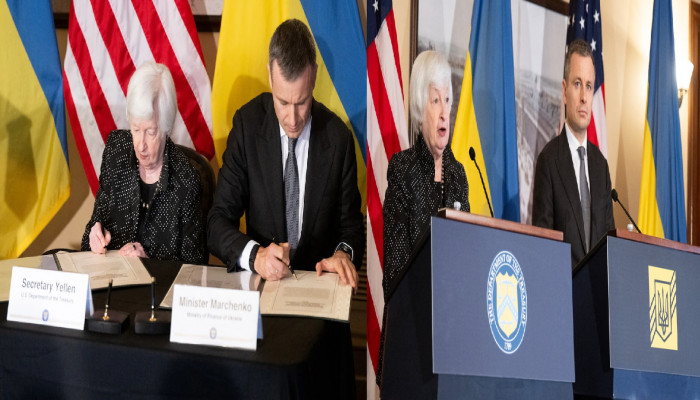U.S. and allies seal $50 billion Ukraine loan backed by interests from Russian frozen assets
- In Reports
- 01:24 PM, Oct 24, 2024
- Myind Staff
Treasury Secretary Janet L. Yellen and Ukrainian Finance Minister Sergii Marchenko signed an agreement on Wednesday to provide $50 billion in loans to Ukraine. This deal helps resolve delays that had been going on for months and provides Ukraine with the money it urgently needs before the year ends.
The plan depends on the interest earned from about $280 billion in Russian central bank assets that are currently frozen in Western accounts since the war began in 2022. This interest, which is expected to amount to several billion dollars each year, will be used to repay the loans gradually. The United States plans to lend $20 billion before the end of this year, while European and other Western allies are expected to contribute over $30 billion more.
In an effort to prevent it from falling on Western taxpayers, Yellen said this week that allies have agreed to demand that Russia repay the loan if the war ends before the interest can cover the entire amount. International Monetary Fund and World Bank meetings have brought finance ministers from all over the world to Washington. The development is a win for Yellen, who has spent much of this year trying to figure out how to leverage Russian central bank assets to support Ukraine with the cooperation of her international peers. It also illustrates the extreme measures used by the Western allies to keep the money flowing to Kyiv, an brave choice that, until recently, few officials believed was feasible.
“[Russian President Vladimir] Putin is engaged in a contest of wills with our coalition, and he is counting on us to retreat,” Yellen said at a news conference Wednesday. “We will not retreat. … We will do everything we can to support Ukraine.” The loan, according to a statement released by President Joe Biden on Wednesday, "is another reminder to Vladimir Putin that the world has rallied behind Ukraine."
The initiative's supporters contend that the Kremlin should be held accountable for its illegal 2022 invasion of Ukraine, while Russia has called the plan to utilise its bank assets an assault on its sovereignty and the rule of law. Due to the repeated criticism of the Ukrainian cause by previous President Donald Trump, Western officials have been eager to complete the loan before the U.S. election. This month, Kremlin spokesperson Dmitry Peskov described the scheme as "stealing our money."
“They will definitely have legal consequences. This is nothing but illegal expropriation,” Peskov said. “It’s an illegal action.” Ukraine is projected to face a budget deficit of up to $45 billion next year. Oleg Ustenko, an economic adviser to the Ukrainian government, stated that additional financial support from Western countries could prevent the need for painful cuts to government services or tax increases that might severely slow down the economy. Many Ukrainians are also concerned that if Trump wins the presidency, he might stop any further U.S. support for Ukraine, including military aid.
“It’s crucially important from two points of view: We have to make sure the country is about to continue its fight against Russia, so inside the country it’s a very powerful and symbolic action. But it’s also extremely important to mitigate the risk related to a possible cut in financial support if Trump is elected,” Ustenko said. “It’s a big, big question mark if the U.S. will continue to see this level of support, and it could be a significant problem.”
Following its invasion of Ukraine in 2022, the United States and its European allies imposed sanctions that frozen the assets held by Russia's central bank. The majority of the Russian bank assets are held in Europe, and while U.S. officials have since called for all of those assets to be seized and transferred to Ukraine, some European nations fiercely opposed the plan, voicing doubts about its legality and potential to erode investor confidence in the continent.
A successful solution that both parties could accept was the agreement to use only the interest. However, despite the agreement being struck this year, logistical issues delayed the aid's distribution. Washington wanted to ensure that it wouldn't be responsible for loans in the event that the European Union's sanctions were lifted and the assets were unfrozen.
There was concern that Hungary, led by its pro-Moscow Prime Minister Viktor Orban, could block the sanctions, which need to be renewed every six months with unanimous agreement from all E.U. members. The United States wanted the asset freezes to last longer, but Hungary's position made that impossible without the E.U.'s unanimous support.
However, the possibility of another Trump administration increased the pressure on Europeans to take action before the year ended. In recent weeks, the European Union opted to give Ukraine up to 35 billion euros (around $38 billion) after the joint initiative faltered. Even though congressional Republicans and others have expressed worries that American taxpayers have already borne an excessive amount of the war's costs, the United States is now also proceeding. A Washington-based think organisation,Council on Foreign Relations claims that since the war began, Congress has authorised more than $100 billion in aid for Ukraine.
“You shouldn’t be allowed to have it both ways — both to benefit from your position in the global economy and attack the global economy,” said Simon Johnson, an MIT economist, who called the loan a “remarkable achievement” for the U.S. Treasury. “This sends a signal to other countries, including China, that you should play by the rules on international security. It’s an entirely fair and reasonable message.”







Comments